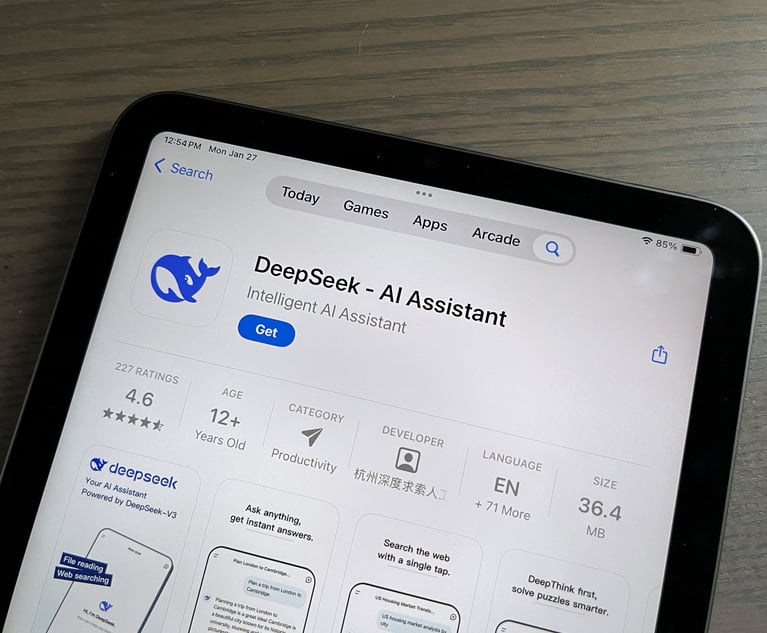'Don't Label Clients as the Problem': General Counsel Respond to Claims They Are at Fault for Mental Health Crisis
Prompted by a LinkedIn post by NetApp GC Matt Fawcett, in-house leaders push back on attorneys' allegations that corporate law departments are to blame for the mental health crisis in the legal profession.
July 18, 2019 at 10:00 PM
5 minute read
The original version of this story was published on Corporate Counsel
 Matthew Fawcett, general counsel with NetApp. Photo: Jason Doiy
Matthew Fawcett, general counsel with NetApp. Photo: Jason Doiy
 Several general counsel and other in-house leaders are pushing back on attorneys' allegations that corporate law departments may play a larger role in the industry's mental health crisis than they may be willing to admit or even examine.
Several general counsel and other in-house leaders are pushing back on attorneys' allegations that corporate law departments may play a larger role in the industry's mental health crisis than they may be willing to admit or even examine.
The response follows the most recent piece in Law.com's "Minds Over Matters" yearlong series: an article titled "Constantly on Call" that states that "client demands for fast turnaround times, even on non-urgent matters, can leave outside counsel in constant crisis mode" and that "many lawyers said legal department leaders often don't think about the impact they're having on outside counsel's mental health, or they don't care—clients pay a high rate for quick responses on all matters."
The rebuttal was prompted by NetApp Inc. GC Matt Fawcett, who in a LinkedIn post Wednesday, said he "take[s] issue" with the "labeling" of in-house counsel as a reason for the high levels of addiction, depression and suicide that have plagued all sectors of the legal industry in recent years.
"To me, the major stressors inside law firms are willfully self-imposed," wrote Fawcett, one of the more outspoken voices, particularly in the in-house arena, in the discussion. "The desire for ever-increasing profits per partner is created by firms, not clients. Firms grow their profits by working their people extra hard, and their refusal to say 'no' to understaffed assignments is a decision. Wellness is rightfully a huge concern now, but where is the responsible mindset on this?"
By Thursday afternoon, Fawcett's post had received 100 "likes" and more than two dozen comments on the social networking site. In an email to Law.com, Fawcett declined to comment further on the post, saying that he doubted he had anything new to say on the topic.
Although outside lawyers were among those who liked Fawcett's comments, many Am Law 100 firm leaders who have been otherwise enthusiastic about openly discussing how they are addressing lawyer mental health issues were skittish about weighing in on a subject where they could risk alienating clients. A spokesperson for one firm, an inaugural signer of the American Bar Association's well-being pledge, appeared eager to have a leader speak about the matter, until learning that no peers wanted to go on the record.
In his post, Fawcett emphasized the importance of open communication between GCs and their outside counsel.
"In my years as a GC, I have never had a law firm call and say, 'Can we talk about adjusting your expectations?' and if that ever happened, I would say, 'yes,'" he wrote. "I believe most GCs want our expensive outside counsel to serve us well, including being honest about load balance and staffing, so we don't unwittingly become the victims of punitive billing. Don't label clients as the source of the problem."
Other in-house leaders agreed, even highlighting the positive relationships they continue to have with lawyers who have been honest about their personal needs.
"One of our outside counsel really saw us through a tough time, and she wanted to take a sabbatical, of which I was very supportive," wrote Ruby Zefo, chief privacy officer at Uber. "During that time she wanted to know if I would mind if she extended it even longer. I said absolutely. We'd survive, and she deserved it. And she's still very much on our payroll now that she's back."
In addition to a need for this open dialogue and collaboration between outside and inside lawyers is the issue of how law firms are allocating their resources, Doug Luftman, vice president, GC and secretary at Nomis Solutions, said in an interview.
"Are law firms training their lawyers about mental health, project management and other critical skill sets that lawyers may not be very good at coming out of law school?" said Luftman, who liked Fawcett's post. "Are they managing their work in a way that doesn't overwhelm people?"
Peter Nguyen, GC and corporate secretary at Canadian company Resolver Inc., said that laying the blame wholly at the feet of clients is "aggressive," particularly since many in-house leaders come from big law backgrounds and thus are sensitive to the demands of working in that environment.
"I try to go out of my way to not overburden my external counsel with demands," Nguyen, who also liked Fawcett's post, said in an interview. "We've been on the other side. We know what it's like to get that Friday afternoon call."
Read more: Minds Over Matters: An Examination into Mental Health in the Legal Profession
Reporter Dan Packel contributed to this report.
This content has been archived. It is available through our partners, LexisNexis® and Bloomberg Law.
To view this content, please continue to their sites.
Not a Lexis Subscriber?
Subscribe Now
Not a Bloomberg Law Subscriber?
Subscribe Now
NOT FOR REPRINT
© 2025 ALM Global, LLC, All Rights Reserved. Request academic re-use from www.copyright.com. All other uses, submit a request to [email protected]. For more information visit Asset & Logo Licensing.
You Might Like
View All
Eighth Circuit Determines No Standing for Website User Concerned With Privacy Who Challenged Session-Replay Technology
7 minute read
The Time Is Now for Employers to Assess Risk of Employees’ Use of DeepSeek
4 minute read
Fired by Trump, EEOC's First Blind GC Lands at Nonprofit Targeting Abuses of Power
3 minute read
Houston Law Firm Files $250K Breach of Contract Suit Against 2 Former Lawyers
3 minute readTrending Stories
- 1How I Made Partner: 'Take Every Opportunity to Get Involved in the Business Side of the Firm,' Says Alyssa Domzal of Ballard Spahr
- 2People in the News—Feb. 5, 2025—Eckert Seamans, Rawle & Henderson
- 3Librarian's Termination Violated First Amendment Protections, Lawsuit Claims
- 4Choice-of-Law Issues as the UCC 2022 Amendments Come into Effect
- 5Six Benefits of Taking an Opposing Medical Expert’s Deposition
Who Got The Work
J. Brugh Lower of Gibbons has entered an appearance for industrial equipment supplier Devco Corporation in a pending trademark infringement lawsuit. The suit, accusing the defendant of selling knock-off Graco products, was filed Dec. 18 in New Jersey District Court by Rivkin Radler on behalf of Graco Inc. and Graco Minnesota. The case, assigned to U.S. District Judge Zahid N. Quraishi, is 3:24-cv-11294, Graco Inc. et al v. Devco Corporation.
Who Got The Work
Rebecca Maller-Stein and Kent A. Yalowitz of Arnold & Porter Kaye Scholer have entered their appearances for Hanaco Venture Capital and its executives, Lior Prosor and David Frankel, in a pending securities lawsuit. The action, filed on Dec. 24 in New York Southern District Court by Zell, Aron & Co. on behalf of Goldeneye Advisors, accuses the defendants of negligently and fraudulently managing the plaintiff's $1 million investment. The case, assigned to U.S. District Judge Vernon S. Broderick, is 1:24-cv-09918, Goldeneye Advisors, LLC v. Hanaco Venture Capital, Ltd. et al.
Who Got The Work
Attorneys from A&O Shearman has stepped in as defense counsel for Toronto-Dominion Bank and other defendants in a pending securities class action. The suit, filed Dec. 11 in New York Southern District Court by Bleichmar Fonti & Auld, accuses the defendants of concealing the bank's 'pervasive' deficiencies in regards to its compliance with the Bank Secrecy Act and the quality of its anti-money laundering controls. The case, assigned to U.S. District Judge Arun Subramanian, is 1:24-cv-09445, Gonzalez v. The Toronto-Dominion Bank et al.
Who Got The Work
Crown Castle International, a Pennsylvania company providing shared communications infrastructure, has turned to Luke D. Wolf of Gordon Rees Scully Mansukhani to fend off a pending breach-of-contract lawsuit. The court action, filed Nov. 25 in Michigan Eastern District Court by Hooper Hathaway PC on behalf of The Town Residences LLC, accuses Crown Castle of failing to transfer approximately $30,000 in utility payments from T-Mobile in breach of a roof-top lease and assignment agreement. The case, assigned to U.S. District Judge Susan K. Declercq, is 2:24-cv-13131, The Town Residences LLC v. T-Mobile US, Inc. et al.
Who Got The Work
Wilfred P. Coronato and Daniel M. Schwartz of McCarter & English have stepped in as defense counsel to Electrolux Home Products Inc. in a pending product liability lawsuit. The court action, filed Nov. 26 in New York Eastern District Court by Poulos Lopiccolo PC and Nagel Rice LLP on behalf of David Stern, alleges that the defendant's refrigerators’ drawers and shelving repeatedly break and fall apart within months after purchase. The case, assigned to U.S. District Judge Joan M. Azrack, is 2:24-cv-08204, Stern v. Electrolux Home Products, Inc.
Featured Firms
Law Offices of Gary Martin Hays & Associates, P.C.
(470) 294-1674
Law Offices of Mark E. Salomone
(857) 444-6468
Smith & Hassler
(713) 739-1250








